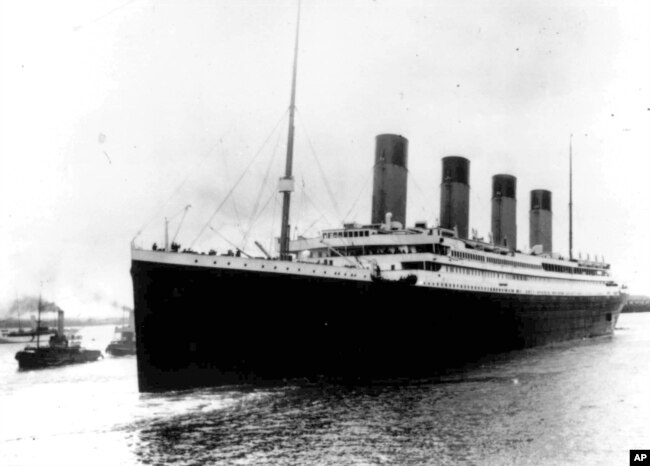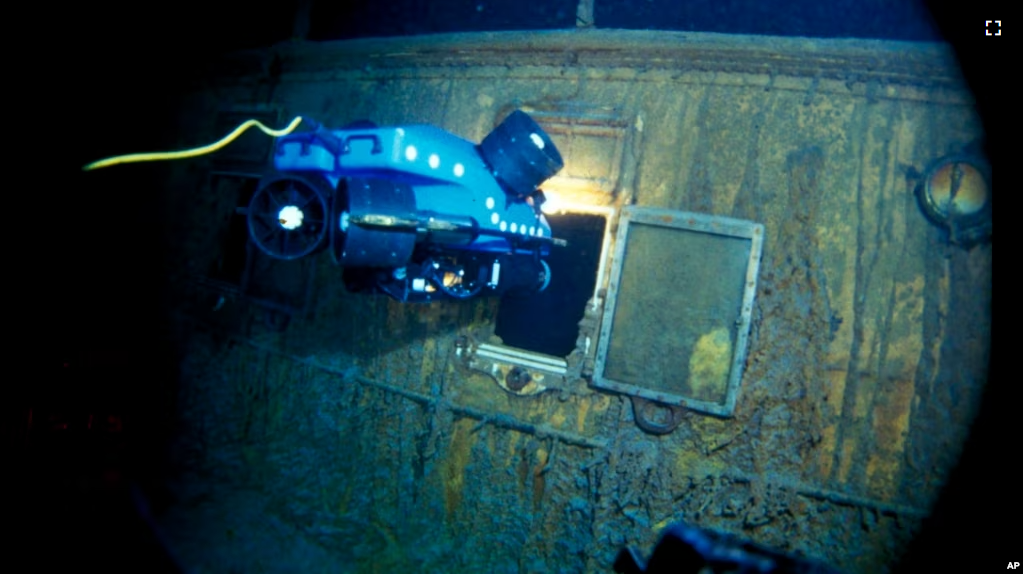The size of the ship and the shoes seized Robert Ballard’s attention when he saw the wreckage of the Titanic from a submarine deep below the sea.
“The first thing I saw coming out of the gloom…was this wall, this giant wall of…steel that rose over 100 and some feet above us,” Ballard told the Associated Press. “I never looked down at the Titanic. I looked up at the Titanic. Nothing was small.”
In 1986, Ballard and a group of explorers from the Woods Hole Oceanographic Institution helped find the famous passenger ship. The Titanic struck a huge piece of ice and sank in the North Atlantic Ocean in 1912. This week, Woods Hole released a video of the wreckage recorded by the explorers more than three kilometers below the ocean’s surface.
Ballard saw the Titanic’s windows. “It was like people looking back at us. It was pretty haunting actually,” he said. There were no human remains left, but he saw shoes, including what appeared to be the shoes of a mother and a baby.
“After the Titanic sank, those that went into the water that didn’t have lifejackets died of hypothermia and their bodies came raining down,” he said.
The Titanic sank after hitting an iceberg in the early morning hours of April 15, 1912. The vessel was on its first trip from Southampton, England, to New York City.
The Woods Hole team, in partnership with the French Research Institute for Exploitation of the Sea, discovered the final resting place of the ship in 3,780 meters of water on September 1, 1985, using an underwater camera. The newly released video was from a second research trip the following year.
There had been earlier efforts to find the sunken ship. But the 1985 discovery and the 1986 trip were made possible by underwater vehicles that could withstand the severe conditions, said Woods Hole engineer Andy Bowen.
“The water is near freezing temperatures and probably the biggest challenge is the remoteness of the location, and in particular the harsh environment with regard to the pressure our equipment is exposed to,” he said.
“We had a small memorial service for all those that had died. But we were there, we were at this spot,” Ballard said.

The video is part of the 25th-anniversary release of the Academy Award-winning movie Titanic.
“More than a century after the loss of Titanic, the human stories embodied in the great ship continue to resonate,” James Cameron, the film’s director, said in a statement.
Ballard said the story of the Titanic continues to interest people to this day for many reasons. It was at the time the world’s largest passenger ship and was supposed to be unsinkable. Its passengers included some of the world’s wealthiest and most famous people. After it sank, the world heard remarkable stories of heroism and bravery by the crew and passengers.
He said: “I think everyone wonders in their own mind ‘If I were there, what would I have done?’”
I’m Mario Ritter, Jr.
Rodrique Ngowi and Mark Pratt reported this story for the Associated Press. Hai Do adapted it for VOA Learning English.
______________________________________________________________________
Words in This Story
gloom –n. partial or total darkness
feet –v. (pl.) an English unit of measurement equal to .3 meters
haunting –adj. sad or beautiful in a way that is unforgettable
lifejacket –n. a device that floats and is worn to prevent people from drowning
hypothermia –n. (medical) a condition in which the body’s temperature becomes too low
challenge –n. a difficult problem
remoteness –n. the state of being far away from anything or anyone
location –n. the place of something
century –n. one hundred years
resonate –v. to have a special meaning or importance to someone in a way that lasts
